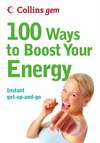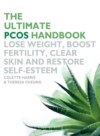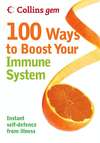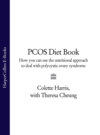Kitabı oku: «100 Ways to Boost Your Energy»
100 Ways
to Boost
Your Energy
Theresa Cheung
 Collins gem
Collins gem
Table of Contents
Cover Page
Title Page
Introduction
Part One: Understanding Energy
What is energy?
The causes of low energy: energy-drainers
Energy-draining medical conditions
The energy solution
Part Two: 100 Energy Boosters
Boost energy with a good night’s sleep
Boost energy with food
Boost energy with movement
Boost energy naturally
Boost energy with supplements
Boost energy with positive thinking
Boost mental energy
Part Three: Instant Pick-me-ups: Recharge In 60 Seconds Or Less
Index
Copyright
About the Publisher
INTRODUCTION
TIRED ALL THE TIME?
Along with more time and more money, more energy is high on everyone’s wish list. Without doubt, energy is an essential in today’s overstretched, high-speed, 24/7 wired world; but it can be hard to recharge your batteries when there is a constant drain on your energy supplies.
Energy-shutdown is something most of us have experienced from time to time. Remember that drained feeling when, however much you have looked forward to a party, new movie or hot date, you just can’t summon the energy to go? What is tougher to recognise, however, is low-key energy-drain. This is when you don’t get that tired-all-over feeling but you do experience a gradual but increasing lack of enthusiasm for activities you used to get excited about. Getting out of bed in the morning seems harder, concentrating on what you are doing is a challenge and, most surprisingly, as you aren’t normally like this, you find yourself getting worked up about the silliest things.
If this ‘grumpy and run down’ theme is starting to sound very familiar, don’t despair. There are energy-drainers all around us – some obvious, some hidden. The good news is that you can find ways to deal with virtually all of them. Try one or all of the 100 simple and practical energy boosters in this book and, however hectic your lifestyle, you’re bound to see your energy levels soar. Use them both as ‘quick pick-me-ups’ when the going gets tough, and as energisers to increase your stamina in the long run, so that you have all the get-up-and-go you need to rise and shine every day.
Use them to help put a spring in your step and a twinkle in your eyes so that you look and feel alert, vibrant and sparkling with energy.
PART ONE: UNDERSTANDING ENERGY
What is energy?
Energy is life. It is the invisible force that animates the human body and permeates everything in the natural world, including animals, plants, trees and mountains, as well as the earth, sun, moon and stars. Whenever something moves, heats, cools, grows, changes or produces light or sound, energy is involved.
One of the simplest forms of energy is metabolic; this is the energy we get from the food we eat and the air we breathe. In short, energy means that birds can fly, winds can blow, the sun can shine, cars can go fast, light bulbs can glow and you can read this book. Without energy there would be nothing: no life, no movement, no light, no books…nothing.
‘Vital energy’ is a term used to describe the collective physical energies of the mind and body working together to produce feelings of well-being. In other words, it means feeling glad to be alive, and bursting with health and energy. Typically children are bursting with vital energy – but an increasing number of adults are finding it harder and harder to remember the last time they felt like that.
Energy and health
A healthy person is a person who has a sense of well-being characterised by a high level of energy and the ability to cope with stress. Feeling tired and stressed a lot of the time is not healthy. Unfortunately, many of us unconsciously settle for energy levels that are lacklustre, in the belief that it is normal to ‘run on empty’. But low energy levels are certainly not normal or healthy.
Energy is our most precious human resource. If we don’t have it, not only is our immunity low and our health at risk, but we don’t have the ‘oomph’ we need to rise to the challenge of work, have fulfilling relationships and experience the joy of being alive that is our birthright. If we don’t have energy, we are simply going through the motions of life.
Although energy can put a spring in our step and help keep disease at bay, it’s important to remember that healthy energy levels are also balanced energy levels. In other words, we need to have the energy to meet the challenges of life without going into overdrive. Overdrive is certainly not good for our health and well-being because it makes it hard to switch off and relax, and increases our risk of stress and poor health. What we need to be aiming for isn’t constantly high energy levels but a steady flow of balanced physical, emotional and mental energy; these balanced levels are essential if we are genuinely to experience good health and vitality.
Energy peaks and troughs
It’s important to know that our energy level won’t remain constant throughout the day; there will be natural dips. In fact, scientists have identified 2.16 p.m. as the time most of us experience an energy dip, so if you get a slump around this time it does not mean that anything is ‘wrong’.
Some energy lows are of our own doing – caused by those late nights or too much caffeine – but the conductor of our energy levels is a cluster of cells that lie deep within our brains, directing our daily release of hormones, our shifts in body temperature and our blood pressure. This conductor produces what are called ‘circadian rhythms’.
Research has shown that one of the most powerful regulators of our internal body clock or circadian rhythm is light. When photoreceptors in our eyes and other places absorb light, they send a signal to our brains to stop producing melatonin, the so-called sleep hormone. With light comes a cessation of melatonin production, and our gradually increasing body temperature makes us feel alert. During the day our temperature fluctuates, rising in the mid-morning, hitting a low at around 3 p.m. and then rising again in mid-afternoon; this could explain why we often get a second wind around this time. By 11 p.m., when the lights are usually turned off, melatonin production starts and temperature, heart rate and blood pressure drop in preparation for sleep.
It’s important to understand the physical rhythms that guide our days so we can learn to make the most of energy peaks and prepare ourselves for energy troughs. One way to keep track is to have an energy diary and write down the times when you feel alert or tired during the day. Once you are aware of your ‘downtime’, you can plan your life accordingly. For example, if you get a slump at around 3 p.m. you can avoid planning meetings at that time – or use some of the instant pick-me-up tips on pages 175–89. If, however, you find that your energy is constantly low or that you have more troughs than peaks during the day, your energy levels are lower than they should be.
Symtoms of low energy
Symptoms of low energy vary from person to person. In general when your energy is low, although you may be able to cope with your normal routine, you’ve lost that spring in your step and anything that requires a little more effort tires you quickly. You may often simply wake up tired and just have a general feeling of being out of sorts.
To rate your energy levels, answer the following questions:
☐ When you wake up in the morning, do you drag yourself reluctantly out of bed?
☐ Do you find yourself longing for an afternoon nap in the morning?
☐ At the end of the day, is slumping in front of the TV all that you want to do?
☐ During meetings do you easily become distracted or bored, or find it hard to keep your eyes open?
☐ Do you sometimes feel that you haven’t got the energy to get through the day?
☐ Do you fall asleep the moment your head hits the pillow?
☐ Do you often feel so wound up that it is hard to get to sleep?
☐ Does seeing or talking to friends seem like a huge effort sometimes?
☐ Is it hard to remember things or to concentrate at work?
☐ Do you find yourself getting worked up or impatient about the smallest things?
☐ Do you need caffeine or other stimulants to help you through the day?
☐ Are you susceptible to colds and other minor illnesses?
☐ Do you find it difficult to raise much enthusiasm for doing anything at all?
☐ Is it hard for you to accept or deal with change?
☐ Has it been a few weeks since you had a good laugh?
If you have ticked more than two boxes, this suggests that your energy levels are lower than they should be.
The causes of low energy: energy-drainers
Low energy is a concept that’s hard to define. Everyone will have their own idea of what being tired means, and we all feel tired once in a while; but if you feel that you have lost some of your zest for life, your energy levels are lower than they should be and you need to find out why.
Identifying what is causing your energy to dip is important because once you know what is robbing you of your vitality, you can then take steps to avoid it or manage it positively.
In most cases there is not one single cause that contributes to low energy, but a combination of several factors. Listed below are some of the most common energy-drainers including poor-quality sleep, unhealthy eating, lack of exercise, environmental factors, stress and underlying medical conditions. Review the information and use it to help you recognise your most common energy-drainers so that you can make positive changes to your diet and/or lifestyle, or seek medical advice. Then you are all set to re-energise yourself by cultivating the energy-boosting advice from page 41 onwards.
Sleep deprivation
Not getting a good night’s sleep is a common reason for low energy during the day. Between 7 and 8 hours of quality sleep a night is what most people need. Anything less than that and your immune system and your body’s battery-boosting systems suffer. This can lead to poor concentration, erratic judgement, slow reaction times, memory problems and poor physical performance, as well as mood swings and irritability.
Your sleep–waking cycle is regulated by the stimulus of sunrise and sunset, but a frantic and unhealthy lifestyle can upset your body clock, causing sleeping problems, fatigue and chronic sleep deprivation. It is certainly possible to train yourself to get by on less sleep, but during sleep both body and brain are restored, rejuvenated and re-energized. So why would you skimp on such a valuable energy-boosting resource? To find out if you are getting enough quality sleep, do any of the following apply to you?
Needing an alarm clock to wake up.
Falling asleep within 5 minutes of getting into bed.
Trouble getting out of bed in the mornings.
Drowsiness during the day and especially around 4 p.m..
Dozing off while watching TV, after a heavy lunch, or in a public place such as a meeting or at work.
Excessive yawning.
Need for caffeine and stimulants to get through the day.
If two or more items on this list apply to you, this suggests a lack of good-quality sleep. You should pay particular attention to the good sleep advice on pages 42–56.
Unhealthy diet
A well-balanced, healthy diet is essential for high energy levels. At its most basic level, what you eat and drink is the fuel that your body and brain need to function at their peak. Skimp on the quality of that fuel and you will pay the price with weight gain and low energy. Skipping breakfast, not drinking enough water, over-eating, dieting, eating on the run, consumption of caffeine and alcohol and eating a lot of refined, processed foods are the major causes of low energy levels.
Rate your diet
Do you eat breakfast every morning?
Do you eat at least 2,000 calories each day, mostly comprised of healthy, freshly prepared whole foods?
Do you grab a piece of fruit and a handful of nuts and seeds instead of a bar of chocolate to fight your midday doldrums?
Do you limit yourself to fewer than three cups of coffee every day?
Do you drink six to eight glasses of fluid every day (colas and coffee don’t count!)?
Do you make sure you eat something every couple of hours?
Do you sit down and take your time when you have a meal, chewing your food thoroughly?
More than one ‘no’ answer suggests that your diet may play a role in your energy crisis. You should therefore pay particular attention to the diet-related energy-boosting tips on pages 57–91.
The sugar blues
Almost all of your energy comes from glucose (sugar). Therefore, maintaining an even blood sugar level is essential to ensure your energy levels are healthy and your mood upbeat. The best way to control your blood sugar levels is to watch what you eat, in particular what carbohydrates you eat.
Carbohydrates are broken down into sugar, which gives your body energy. The speed at which this process occurs affects your mood, weight and energy, and your ability to cope with stress. Some carbohydrates raise your blood sugar levels quickly, while others take their time. Fast-releasing carbohydrates, such as sugar and white flour, send your blood sugar levels rocketing very quickly after eating them, so you get a burst of energy. Unfortunately this is soon followed by a rapid dip in sugar which means you feel tired and sleepy – that ‘energy trough’ – and you crave another fix all over again. Slow-releasing carbohydrates, on the other hand, such as wholegrains and vegetables, give you a steady release of sugar and energy, keeping your energy levels constant.
Eating food that is going to keep your blood sugar levels and your energy levels constant is therefore vital. The rate at which food releases glucose into your bloodstream can be measured on the glycaemic index (GI). If you haven’t got the time to work with the GI, a general rule is that the more natural and unprocessed a food is, the lower it is on the GI and the better it is for you. In a nutshell, the closer food is to its natural, unrefined state, the richer it is in nutrients and the greater its energy potential. A diet that is rich in fresh, natural wholegrains, fruits and vegetables, legumes, nuts and seeds, and low in red meat, sugar, white flour, refined and processed foods which have been stripped of their fibre, vitamin and mineral energy, fast foods and ready meals, will help you avoid the dips in energy and mood that come with fluctuating blood sugar levels.
For more advice on energy-boosting nutrients and foods, check out the tips on pages 84–5.
Stimulants
When blood sugar levels dip or fatigue sets in, many people turn to stimulants such as tea, coffee, sugary drinks, cigarettes and chocolate to keep them going. Although they can give you a temporary high, the long-term effects of stimulants are always bad.
Alcohol is made from yeast and has a similar effect to sugar in your body, giving you a temporary high followed by a long low.
Coffee is a diuretic which depletes your body of nutrients and it also contains caffeine which disturbs normal sleep patterns.
Many fizzy drinks contain caffeine, as well as sugar and colourings which act as stimulants.
Tea is a stimulant with similar but weaker effects to coffee, and it contains tannin which interferes with the absorption of minerals.
Chocolate contains theobromine which has an action similar to, but not as strong as, caffeine.
Medications for the relief of headaches also contain caffeine.
Cigarettes contain cancerous chemicals and the stimulant nicotine which is sedative in large amounts.
Stimulants are your body’s greatest energy-drainers, so one of the most important steps you can take to beat fatigue is to give up or cut down on stimulants. Giving up all these stimulants at once would be impossible for most people, as well as being incredibly stressful. The first step, therefore, is to identify which stimulants you are using as pick-me-ups to get you going when your energy is flagging, and to cut consumption of them down gradually.
To cut down on stimulants without suffering try the following:
Sugar: When you crave something sweet, eat some fruit. Don’t replace sugar with sugar substitutes, as these do not help you re-educate your taste buds. Take the sugar bowl off the table and give yourself a month to gradually cut down. Read labels and find healthier alternatives. Stick with it and after a few weeks you will find that your taste buds adapt.
Coffee: Coffee is addictive and it takes about a week to break the habit. You may find yourself feeling groggy for a few days, but this will remind you how addictive and bad for you too much coffee is. Instead of coffee, drink herbal teas or coffee alternatives such as dandelion coffee. After a week you can go back to one or two cups of coffee a day, but as a treat, not as an energy booster.
Tea: Tea isn’t as energy-draining as coffee unless you drink gallons of it a day. Two or three cups a day is fine, but it is still worth experimenting with herbal teas or drinking your tea slightly weaker.
Chocolate: If you adore chocolate, you don’t need to give it up completely. Just eat it in moderation, for example four times a week rather than every day. Most important of all, don’t use it as a pick-me-up as it will have the opposite effect. Go for fruit with a handful of nuts and seeds instead if you need something sweet and satisfying.
Alcohol: If you drink a lot, start by reminding yourself that you don’t actually need to have a glass in your hand to have a good time. Set yourself a weekly target of five to seven drinks a week and stick to it. If you find this impossible, seek professional advice.
Smoking: This is perhaps one of the hardest energy-draining habits to break and one for which you may need to seek the advice of your doctor if you want to quit. It really is worth persisting, though, as many people who give up find that their energy levels soar. To reduce your cravings you need to boost your body’s ability to eliminate chemicals. A healthy diet, plenty of exercise and drinking lots of water can all help detoxify your body.
Dieting
If you’re cutting calories and skipping meals in an effort to control your weight, there’s a good chance you’re simply not giving your body the essential nutritional building-blocks it needs to operate at peak capacity.
Dieting or going for long periods without food is the worst thing you can do for your energy levels. Not only will nutritional deficiencies trigger fatigue, your blood sugar levels will plummet and, as mentioned previously, low blood sugar levels are directly related to fatigue. Eating regularly scheduled meals, with healthy snacks in between, will ensure that your blood sugar levels are balanced and you have the necessary fuel to perform at your best all day.
When you skip meals you fail to replenish your energy reserves, so always have breakfast, aim for a good lunch during the day, and keep nutritious snacks to hand. Avoid big meals because they divert blood flow to your digestive tract, making you feel heavy and tired. It is vital that you avoid large meals at bedtime, as your body will spend the night processing food rather than healing and repairing tissue. Eat little and often (be a ‘grazer’ not a ‘gorger’), and have a little healthy protein with each meal or snack – such as some nuts with a piece of fruit – because protein has a stabilizing effect on your blood sugar.
You would not expect your car to run on empty, so treat yourself as well as your car. You’ll know that driving at a constant speed gives your car the best mileage. Likewise, if you keep yourself well fed throughout the day, your metabolism will be at its best too, which means you have more energy and are in calorie-burning mode.
Ücretsiz ön izlemeyi tamamladınız.

![The Dream Dictionary from A to Z [Revised edition]: The Ultimate A–Z to Interpret the Secrets of Your Dreams](https://cdn.litres.ru/pub/c/cover_100/48653382.jpg)







